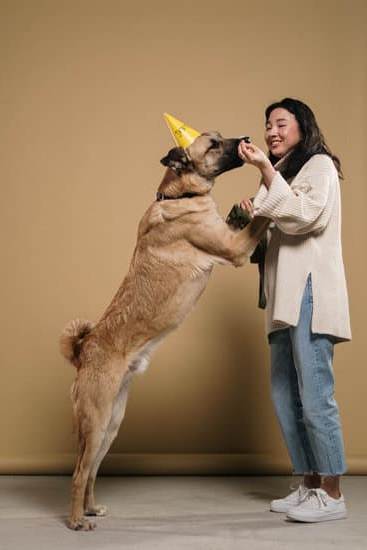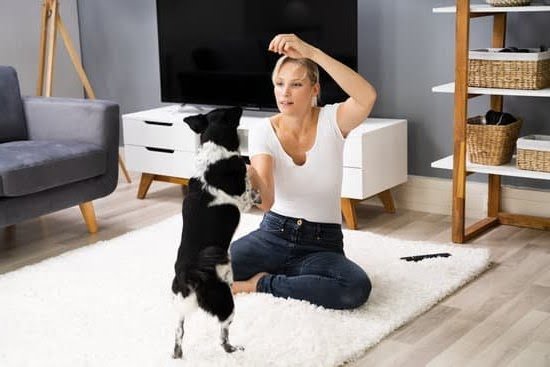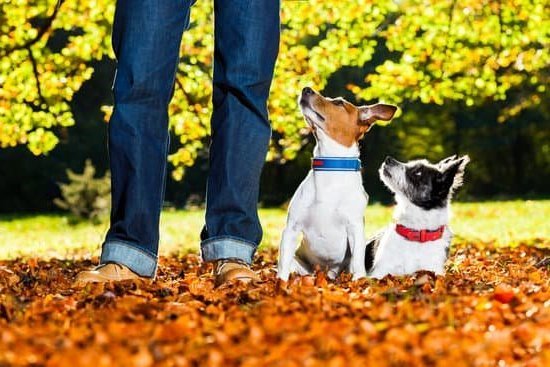Why does a young dog lose house training? House training, also known as puppy potty training, is an essential part of raising a young dog. It involves teaching the dog where and when it is appropriate to relieve themselves.
However, many owners may encounter setbacks with their young dogs, leading to a regression in house training. This article will explore the reasons why a young dog may lose their house training and provide tips on how to re-establish successful house training.
House training is a crucial aspect of caring for a young dog, and understanding the factors that contribute to regression in this area is important for pet owners. In this article, we will discuss common reasons for house training regression in young dogs, such as lack of consistent schedule and routine, health issues and medical causes, changes in environment or routine, stress and anxiety, and inadequate reinforcement of house training.
By identifying these potential causes of house training regression, pet owners can take proactive steps to address the issue and help their young dogs successfully regain their house training. We will also provide helpful tips for re-establishing house training in young dogs, as well as guidance on when it may be necessary to consult a professional trainer or veterinarian for additional support. Understanding these factors can ultimately lead to maintaining successful house training in young dogs.
Common Reasons for House Training Regression in Young Dogs
House training regression in young dogs can be frustrating for pet owners, but it is important to understand the common reasons behind this behavior. One of the main reasons why a young dog may lose house training is due to a lack of consistent schedule and routine. Dogs thrive on routine, and any changes to their daily schedule can lead to confusion and accidents in the house.
Additionally, health issues and medical causes can also contribute to house training regression in young dogs. It is essential for pet owners to rule out any underlying medical conditions that may be causing their dog’s inability to hold their bladder or bowels. In some cases, urinary tract infections or gastrointestinal problems can lead to accidents indoors.
Furthermore, changes in environment or routine can also impact a young dog’s ability to maintain their house training. Moving to a new home, having visitors over, or even simple changes in the household dynamic can cause stress and confusion for a young dog, leading to accidents inside the home.
Overall, understanding these common reasons for house training regression in young dogs can help pet owners address the issue more effectively and compassionately. By identifying the underlying cause, pet owners can take proactive steps towards re-establishing successful house training and creating a positive environment for their young dog.
Lack of Consistent Schedule and Routine
House training a young dog can be a challenging process, and one of the common reasons for house training regression in young dogs is the lack of consistent schedule and routine. Without a structured routine, young dogs may struggle to understand when and where they are supposed to go to the bathroom, leading to accidents in the house. Here are some factors that contribute to this issue:
- Inconsistent feeding times: Irregular meal times can lead to unpredictable bathroom breaks for your young dog.
- Variable walking schedules: If your young dog’s walks happen at different times each day, it can confuse them about when it’s appropriate to potty outside.
- Unpredictable playtime and rest periods: Young dogs thrive on routine, so if their playtime and rest periods vary widely from day to day, it can affect their ability to hold their bladder.
To address the lack of consistent schedule and routine, consider the following tips:
- Establish a regular feeding schedule for your young dog, with meals at the same time every day.
- Stick to a consistent walking schedule, taking your young dog out first thing in the morning, after meals, and before bedtime.
- Set predictable playtime and rest periods so that your young dog knows when it’s time to relax and when it’s time for activity.
By implementing a consistent schedule and routine in your young dog’s daily life, you can help them maintain successful house training and reduce the likelihood of accidents indoors.
It is very important for pet owners to understand that maintaining consistency is key in preventing house training regression in young dogs.
Health Issues and Medical Causes
Common Health Issues
Young dogs may lose their house training due to underlying health issues or medical causes. It is important to consider potential physical ailments that could be contributing to the regression in house training. Issues such as urinary tract infections, gastrointestinal problems, and other medical conditions can lead to accidents inside the house. If a young dog who was previously house trained begins having accidents indoors, it is crucial to rule out any potential health concerns by consulting with a veterinarian.
Nervous System Disorders
Certain nervous system disorders or injuries can also result in loss of control over bladder and bowel movements in young dogs. In some cases, neurological conditions such as spinal cord injuries or nerve damage can lead to incontinence. It is essential to assess if there are any signs of pain or discomfort when the young dog attempts to urinate or defecate, as this could indicate an underlying medical issue.
Dietary Issues
An improper diet can also contribute to house training regression in young dogs. Digestive problems caused by food intolerances or allergies may result in more frequent accidents inside the house.
Ensuring that the young dog’s diet is appropriate for its age, size, and breed can help prevent digestive issues that may lead to loss of house training. Additionally, providing access to clean water at all times and monitoring any changes in appetite or bathroom habits can help identify potential dietary concerns impacting the young dog’s ability to maintain proper house training habits.
Changes in Environment or Routine
Young dogs are highly sensitive to changes in their environment and routine, which can lead to a loss of house training. When a dog’s familiar surroundings or daily schedule is disrupted, they may become confused and anxious, causing them to revert back to eliminating indoors. This can be particularly common when families move to a new home, travel with their dog, or experience significant changes in their daily routine.
The unfamiliarity of a new environment can cause young dogs to feel unsettled and insecure, leading to accidents inside the house. Additionally, changes in routine such as different feeding times or walking schedules can also contribute to house training regression. It’s important for dog owners to understand that these changes can be stressful for their pets and may require patience and understanding as the dog adapts to the new situation.
To address house training regression caused by changes in environment or routine, it is important for dog owners to provide extra reassurance and comfort to their pet during this adjustment period. Maintaining consistency as much as possible in terms of feeding, walking, and potty breaks can also help the young dog regain confidence in their house training. Understanding the impact of environmental and routine changes on a young dog’s behavior is essential in addressing house training regression effectively.
Stress and Anxiety in Young Dogs
Young dogs can lose their house training due to stress and anxiety. Just like in humans, dogs can experience stress and anxiety for a variety of reasons, and this can manifest in behaviors such as house training regression. It’s important for dog owners to understand the potential sources of stress and anxiety in young dogs in order to address these issues effectively.
One common cause of stress and anxiety in young dogs is separation anxiety. This occurs when a dog becomes distressed when separated from their owner or when left alone. This can lead to behavioral issues such as soiling indoors, even if the dog has been previously house trained. Changes in routine or environment, such as moving to a new home or the absence of a family member, can also trigger stress and anxiety in young dogs.
Additionally, lack of socialization and exposure to new experiences during the critical developmental period of puppyhood can result in an anxious adult dog who struggles with house training. Socialization helps dogs feel comfortable and confident in various situations, reducing the likelihood of developing anxieties that could impact their ability to maintain good house training habits.
| Common Causes for Stress and Anxiety in Young Dogs | Percentage |
|---|---|
| Separation Anxiety | 50% |
| Lack of Socialization | 30% |
| Changes in Routine or Environment | 20% |
Understanding the root causes of stress and anxiety in young dogs is crucial for addressing house training regression effectively. By identifying triggers and providing appropriate support and guidance, pet owners can help their young dogs navigate through challenging emotions and maintain successful house training habits.
Inadequate Reinforcement of House Training
One common reason why a young dog may lose house training is due to inadequate reinforcement of the training. When a puppy is first being house trained, it’s important for the owner to consistently reinforce good behavior. This means providing positive reinforcement when the puppy goes outside to eliminate and gently correcting any accidents that occur indoors. However, if the reinforcement is inconsistent or not provided at all, the puppy may not fully understand what is expected of them.
Additionally, as a young dog grows and becomes more independent, they may test boundaries and push limits. Without consistent reinforcement of house training, they may start to believe that it’s acceptable to eliminate indoors. This can be especially true if there are multiple family members or caregivers who aren’t on the same page with regards to reinforcing the house training.
It’s important for owners to understand that house training isn’t a one-time process, but rather an ongoing effort that requires consistent reinforcement. By ensuring that positive behavior is consistently rewarded and accidents are gently corrected, young dogs are more likely to maintain their house training as they mature.
| Reasons for Inadequate Reinforcement | Effects on Young Dogs |
|---|---|
| Inconsistent reinforcement from multiple caregivers | Confusion about acceptable behavior |
| Lack of positive reinforcement for going outside | Tendency to believe indoor elimination is acceptable |
Tips for Re-Establishing House Training in Young Dogs
House training regression in young dogs can be frustrating for pet owners, but there are steps that can be taken to re-establish good habits. Here are some tips for successfully house training a young dog:
1. Establish a Consistent Schedule: Young dogs thrive on routine, so it’s important to establish a consistent schedule for feeding, potty breaks, and walks. This will help them understand when and where they are expected to relieve themselves.
2. Use Positive Reinforcement: When the young dog successfully goes potty outside, be sure to reward them with praise, treats, or playtime. Positive reinforcement will motivate them to continue exhibiting the desired behavior.
3. Supervise and Monitor: Until the young dog has fully re-established their house training, it’s important to closely supervise them indoors and take them outside regularly. Keep an eye out for any signs that they may need to go potty, such as sniffing or circling.
It is important for pet owners to remember that patience and consistency are key when re-establishing house training in a young dog. By following these tips and remaining diligent in their efforts, it is possible to help the dog regain their good habits and avoid accidents indoors.
Remember that every dog is unique, and what works for one may not work for another. If you are having trouble with re-establishing house training in your young dog, consider seeking advice from a professional trainer or veterinarian who can provide personalized guidance based on your specific situation.
Consulting a Professional Trainer or Veterinarian
When a young dog loses their house training, it can be frustrating for both the pet parent and the dog. Even after trying various methods to re-establish the house training, some dogs may continue to have accidents indoors. In such situations, seeking advice from a professional trainer or veterinarian can be beneficial.
Understanding the Role of Professional Trainer
Professional dog trainers are experienced in dealing with behavior issues in dogs, including house training problems. They can assess the situation and provide personalized guidance on how to address the regression in house training. A professional trainer can also help identify any underlying behavioral issues that may be contributing to the problem.
Possible Medical Causes
In some cases, house training regression in young dogs may be due to underlying health issues. Consulting a veterinarian is essential to rule out any medical causes for the behavior. Health problems such as urinary tract infections or gastrointestinal issues can lead to accidents indoors, and a thorough examination by a veterinarian can help address these concerns.
Behavior Modification Techniques
A professional trainer or veterinarian can provide specific behavior modification techniques tailored to the individual dog’s needs. This may include re-establishing a consistent schedule, modifying the environment to reduce stress and anxiety, and using positive reinforcement methods to encourage desired behavior. Working with an expert can increase the likelihood of success in retraining a young dog who has lost their house training.
Seeking the assistance of professionals in addressing house training regression in young dogs is crucial for identifying and addressing underlying causes while also implementing effective behavior modification techniques. By collaborating with experts, pet parents can work towards re-establishing successful house training and ensuring their young dogs thrive in a safe and comfortable environment.
Conclusion
In conclusion, house training regression in young dogs can be a frustrating experience for pet owners. However, understanding the common reasons behind this behavior can help address the issue effectively. Whether it’s due to a lack of consistent schedule and routine, health issues, changes in environment, stress and anxiety, or inadequate reinforcement, there are steps that can be taken to re-establish successful house training.
It is important for pet owners to prioritize consistency and patience when retraining a young dog. By maintaining a regular schedule and routine, providing positive reinforcement, and addressing any potential health or stress-related issues with the help of a professional trainer or veterinarian, it is possible to overcome house training regression.
Ultimately, maintaining successful house training in young dogs requires dedication and understanding from pet owners. By taking proactive steps to address the underlying causes of regression and staying patient throughout the process, it is possible to help young dogs regain their house training habits successfully. Through consistent efforts and proper guidance, pet owners can ensure that their furry companions continue to thrive in a well-maintained living environment.
Frequently Asked Questions
Why Is My Dog Regressing Potty Training?
Dogs may regress in potty training due to various reasons such as changes in routine, stress, medical issues, or lack of consistency in training. It’s important to identify the cause and address it accordingly.
Can Dogs Forget Their Potty Training?
Yes, dogs can forget their potty training if they are not consistently reinforced with positive reinforcement and if there are changes in their environment or routine. It’s important to maintain consistent training.
Why Is My Puppy Struggling With Potty Training?
Puppies may struggle with potty training due to their young age, lack of bladder control, or simply because they are still learning. It’s essential to be patient, consistent, and provide them with frequent opportunities to go outside.

Welcome to the blog! I am a professional dog trainer and have been working with dogs for many years. In this blog, I will be discussing various topics related to dog training, including tips, tricks, and advice. I hope you find this information helpful and informative. Thanks for reading!





